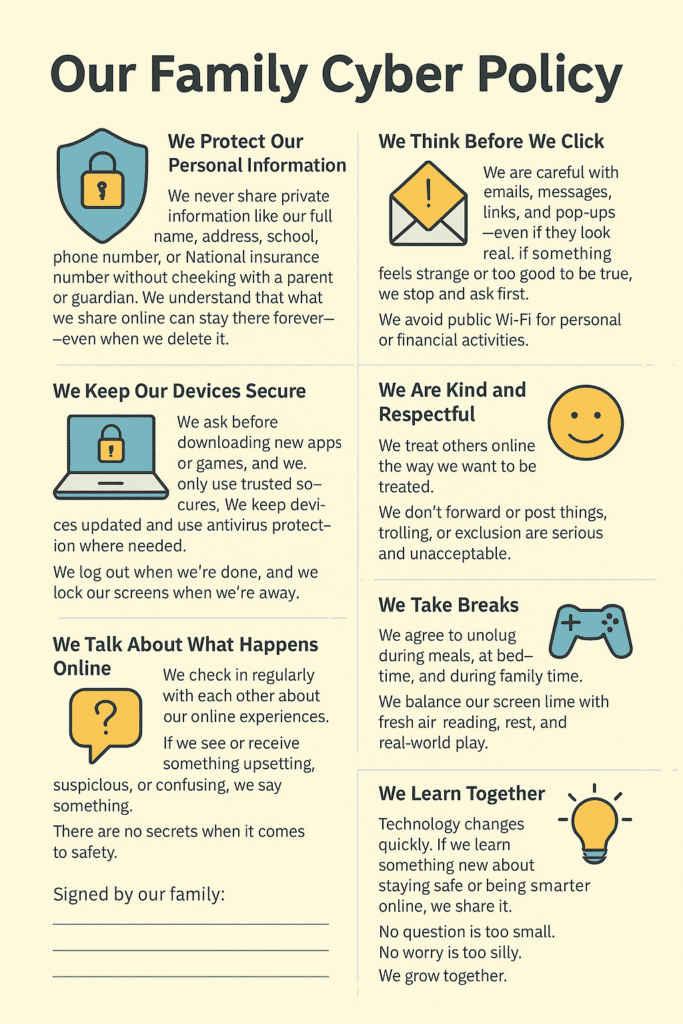Your Family Cyber Policy: Protect Your Child from Identity Theft
A child safe online is the one whose parent is paying attention, not just to the screen, but to the world behind it. We invite you to create your own Family Cyber Policy, to protect your child from identity theft

Cyber hygiene is the foundation of digital safety—the practice of developing healthy, consistent habits when interacting with technology. These habits don’t require advanced knowledge or expensive tools. Instead, they begin with awareness and build slowly, like the brushing of teeth or locking of doors.
The first step is learning what not to share. Names, addresses, birthdays, and school names may seem harmless in isolation, but together they create a profile rich enough to be exploited. Children often share without hesitation, through gaming platforms, social media bios, and friendly online chats. Helping them understand how valuable their personal information is can reframe what they post and how often they post it.
Passwords remain one of the most misunderstood yet powerful tools of protection. Many young users opt for easy, memorable choices—pet names, favourite colours, or predictable dates. Teaching them to create longer, unpredictable phrases and store them safely is one of the most effective defences against unauthorised access. And where available, two-factor authentication offers a second layer of security, like an extra bolt on a front door.
It’s also essential to challenge the myth of “harmless downloads.” Children, especially those drawn to gaming and media, often encounter offers to install new features or apps. These downloads, if unchecked, can become the gateway for malware or spyware. A simple habit of asking before downloading—or verifying the source—can prevent digital infections before they begin.
Then there’s the matter of public Wi-Fi, the modern-day equivalent of leaving the house unlocked. While convenient, these open networks can be exploited by cybercriminals to intercept data. Encouraging children to use secure networks at home or to connect via a virtual private network (VPN) when in public helps protect their activity from prying eyes.
Perhaps most important, though, is cultivating curiosity. Children who are encouraged to ask questions become more mindful users. And mindful users are far harder to exploit.
- “Should I click this link?”
- “Is this email really from my school?”
- “Why does this app want access to my photos?”
Good cyber hygiene is not about fear—it’s about confidence. It gives children the power to explore the digital world without being naive to its dangers. It empowers them to recognise when something doesn’t feel right, and to know that asking for help is not a weakness, but a strength.
Children are not cybercrime experts. Only a parent can equip them with a sense of digital responsibility, a protective instinct that stays with them long after they’ve logged off. Just as we teach them to look both ways before crossing the road, we must now teach them to pause, question, and think before clicking forward.

Digital Cyber Hygiene for Parents: The First Line of Defence
Before children ever touch a smartphone or type their first password, they watch us. They see how we use technology—how we scroll at the dinner table, how we share family updates online, how we store our devices by the bedside. In the digital age, parenting has taken on a new dimension: we are not just guides through the physical world, but guardians of the digital one.
Cyber hygiene, for parents, begins not with their child’s habits, but with their own. It is the quiet, daily discipline of protecting personal data, setting boundaries, and modelling digital responsibility in a world that never switches off.
It starts at home, with small but powerful acts. Passwords—often reused, too short, or stored in plain sight—should be the first to be cleaned up. A password manager, though it may seem unnecessary at first, quickly becomes a lifeline. Strong, unique credentials for banking, school portals, health records, and cloud backups form the invisible shield around a family’s data. Without them, a single breach can unlock the doors to everything.
Next is device awareness. Smartphones, tablets, laptops—these are not toys, even if they’re filled with games. Keeping software and apps updated isn’t just about features; it’s about closing the security gaps that hackers exploit. Automatic updates should be turned on wherever possible, and security settings reviewed regularly—not just when something goes wrong.
Parents are also gatekeepers of sensitive documents. A child’s birth certificate, National Insurance number, or passport details should never be stored loosely on shared devices or emailed without encryption. These items belong in physical safes or secure, encrypted digital vaults—not in a folder marked “Important” on the family desktop.
Your Family Cyber Policy
But digital hygiene isn’t just technical. It’s emotional. It’s cultural. And it begins with at home. Parents who are talking with their children about the internet, help them understand that internet is not a place to be feared, but one to be understood. Conversations about privacy, phishing scams, and social media are not lectures; they are opportunities to build digital fluency together. If a child knows they can come to you when something online feels wrong, the battle is half-won.
It also means leading by example. If children see their parents sharing every detail of their lives on Facebook, they’ll do the same on TikTok or Snapchat. If they watch you checking your bank balance over free café Wi-Fi, they’ll assume it’s safe to do the same. Your digital behaviour becomes their blueprint, even if they never say a word.
Then there’s the home itself—the digital hub. It’s worth reviewing the settings on your home Wi-Fi, making sure the network is password-protected and the router firmware is up to date. Devices should be labelled clearly, unused smart gadgets removed, and unfamiliar activity logged or investigated. If you have smart speakers or home assistants, it’s worth checking what data they’re storing and whether you want that data stored at all.

Digital parenting also means staying informed. Cybercriminals evolve quickly, and scams change shape almost monthly. Signing up to alerts from the National Cyber Security Centre or Action Fraud can keep you a step ahead. So can speaking to your child’s school or local authority about their digital safety protocols—because prevention must extend beyond the front door. But perhaps the most important lesson is this: perfection isn’t the goal. Cyber hygiene is not about eliminating every risk. It’s about building a family culture that respects data, encourages open dialogue, and takes conscious steps to reduce vulnerability.
It’s about making informed choices, staying curious, and creating a safe digital environment where children are not just protected, but empowered.
We do not need to be cybersecurity experts to raise children who are digitally safe. We simply need to care enough to learn, to listen and to lead. A child safe online is the one whose parent is paying attention, not just to the screen, but to the world behind it.
Do you want to share your story and inspire our readers ? Know that YOUR EXPERTISE is paving the way for a fairer, happier society.



